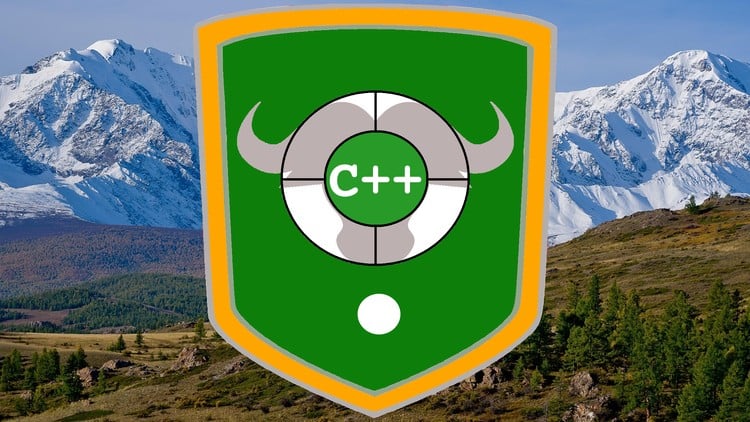
Exploring the C/C++ Commons
Why take this course?
🚀 C/C++ 1000: GNU For Beginners 🐱💻
Dive into the world of C and C++ with a twist – on a Linux platform! Whether you’re on Linux, AIX, MacOS, or even Windows, this course will equip you with the skills to craft C++ applications that run seamlessly across POSIX-inspired operating systems. With tools like Cygwin and WSL, your Windows environment becomes a gateway to the Linux programming landscape.
Why Choose This Course? 🤔
- Legacy Code Mastery: Understand the rich heritage of C/C++ code that continues to be relevant in modern software development.
- Standardized Knowledge: Grasp the nuances between different C/C++ standards and how they affect your code.
- Cross-Platform Skills: Learn to write software that not only compiles on multiple systems but performs consistently as well.
Course Overview: 📚
This course is the first in a three-part series designed for beginners who want to get a solid foundation in GNU C/C++ tools and compilers. We’ll start by laying the groundwork with basic compiler concepts, ensuring you have a comprehensive understanding of the fundamentals before moving on to more complex topics.
Why C/C++? 💡
- High-Performance Software: C/C++ remain go-to languages for high-performance applications across various domains.
- Widespread Reliance: The backbone of every modern operating system, including cloud technologies, relies on software written in C/C++.
- Community Support: The free and open C/C++ community provides robust support to countless other programming languages.
What Will I Learn? 🎓
In this course, you will learn:
- Control Flows: Master the different types of control flows that are fundamental in C/C++.
- Functions and Pseudo Functions: Understand how to define, declare, and use functions effectively.
- Data Structures: Get familiar with structures, typedefs, unions, and how they can be used to model complex data.
- Argument Processing: Learn best practices for processing command-line arguments.
- State Machines: Explore the concept of state machines and how they can manage complex workflows or behaviors.
By the end of this course, you’ll have a strong grasp of GNU C/C++ basics, preparing you for the intermediate stage in our training series – GNU C/C++ 2000. Get ready to join the ranks of proficient developers who can navigate and excel in the world of C/C++ on any platform!
Enroll now to embark on your journey into the fascinating realm of GNU C/C++ for beginners and unlock your potential as a software developer! 🌟
- Deconstruct GNU/Linux Development: Gain a foundational understanding of GNU’s pivotal role in modern C/C++ development. Explore how its open-source philosophy underpins the powerful tools you’ll master, fostering efficient, robust, and collaborative programming within the “C/C++ Commons.”
- Master the GCC Compiler: Dive into the GNU Compiler Collection (GCC), the standard for C/C++ compilation. Learn to invoke
gccandg++from the command line, understand critical flags, manage header dependencies, and link libraries to create optimized executable programs. - Navigate the Shell: Become proficient with essential command-line interface (CLI) tools in a Unix-like environment. Explore file system navigation, basic shell scripting, and key utilities for source code management, compilation, and execution, making the terminal your powerful primary development hub.
- Automate Builds with Make: Discover the power of
maketo automate intricate build processes for C/C++ projects. Learn to author simple to complex Makefiles, defining dependencies and rules to ensure applications compile efficiently, streamlining collaboration and saving hours. - Debug with GDB: Unravel program behavior and logic errors with the indispensable GNU Debugger (GDB). Master debugging techniques like setting breakpoints, stepping through code, inspecting variables, examining memory, and analyzing call stacks to swiftly pinpoint and rectify faults.
- Integrate GNU Standard Libraries: Understand the critical role of the GNU C Library (glibc) as the foundational runtime library for C/C++ programs on GNU/Linux. Learn how your applications interface seamlessly with system calls, standard I/O, and memory management.
- Embrace Version Control: While not exclusively GNU, grasp fundamental Git concepts for modern version control, an indispensable partner to GNU development. Learn to initialize repositories, commit changes, manage branches, and understand project history for collaborative, resilient project management.
- Interpret Diagnostics: Learn to effectively read, understand, and strategically troubleshoot cryptic error and warning messages from GCC and the linker. Develop robust strategies for diagnosing common issues, transforming frustration into productive problem-solving.
- PROS:
- Empowers Command-Line Mastery: Develop unparalleled proficiency in a terminal-centric development workflow, a highly valued skill in professional environments and for resource-constrained systems.
- Deep System-Level Understanding: Gain insights into how C/C++ programs interact with the operating system at a fundamental level, fostering a profound understanding of system programming.
- Foundation for Open Source Contributions: Equip yourself with essential tools and knowledge to effectively engage with and contribute to countless open-source C/C++ projects reliant on the GNU toolchain.
- Cost-Effective Development: Utilize powerful, free, and open-source tools without licensing costs, making high-quality development accessible to everyone.
- CONS:
- Steep Initial Learning Curve: The command-line and toolchain approach can initially feel less intuitive than graphical IDEs, requiring patience and persistence to master.